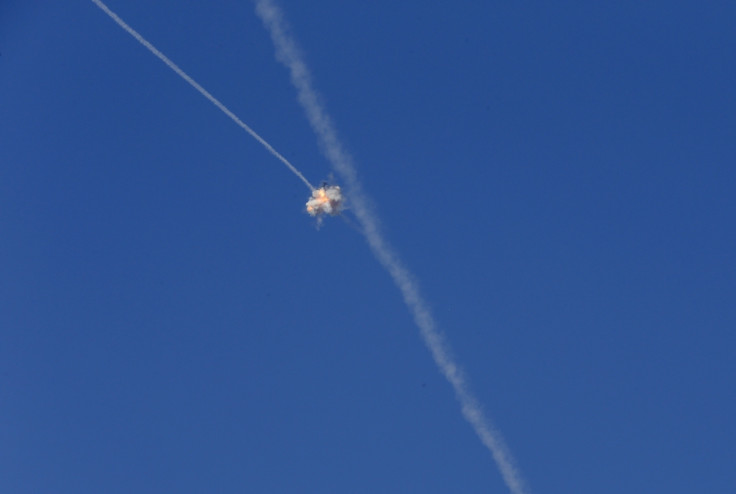Frontline Gaza Strip: Hamas Rockets have Blown up South Israel's Economy

As this article goes live, Israel is running its third operation to halt the ongoing rocket attack on its citizens. Around the world, the media's attention has been focused on the devastation wreaked on Gazan schools, homes and hospitals, and the dreadful human cost of the conflict.
Yet the world should also consider the way the conflict has affected Israel, particularly the southern area near the Gaza border. The way the crossfire of rockets has torn apart the country's economy, ruined millions of livelihoods, and left once prosperous economies in ruin.
On 29 July 2014 the Israeli economy website Calcalist estimated the damages and expenses incurred during 'Operation Protective Edge' to have reached 7 billion shekels. That's around £1.2bn, or just over $2bn - a huge amount of money for a country of Israel's size. And the conflict has raged for a further six days (and counting) since that estimate was published.
Israel's hitherto thriving industrial sector has been particularly badly affected. According to the Industrialists Union, the damage to the Israeli industry is estimated at around £140m, and several factories have been battered by rocket fire.
Furthermore, thousands of local businesses have been affected - the conflict has opened up wounds left by the previous conflicts with Hamas, and a huge cross-section of the country has been affected.
According to the Center of Research and Information of the Knesset, indirect damages sustained during 'Operation Protective Edge' are estimated at 1 billion shekels.
In the wake of previous operations, government ministries, with the lead of the Ministry of Finance, created compensation programmes and aid for local businesses and municipalities that suffered during the operation. This aid has provided vital support; yet it has been unable to paper over the enormous financial cracks created by the constant attacks from Gaza.
Danny Dahan is a retail store owner and head of the small business forum in Sderot, a town close to the Gaza border. He said: "We are in a war that started 14 years ago, and didn't end.
"This war has resulted in mental, cultural and economic instability. It created a 'system breakdown', and through the years we have had no choice but to learn how to live with it. It's like a man hurt in a car crash and becomes disabled. In time, he learns how to function. It doesn't mean he is no longer disabled."
According to Danny, "the economic damage is triply interwoven among suppliers, customers and employees. The suppliers are stressed and afraid to get hurt, so they don't deliver supplies. When we don't have supplies the customers are disappointed, they don't buy, and go to a different place to shop. The cash flow is severely hurt, which impairs our ability to pay the suppliers."
This war has resulted in mental, cultural and economic instability. It created a 'system breakdown', and through the years we have had no choice but to learn how to live with it
- Danny Dahan, retail store owner
Whereas previously customers would stroll around the mall and buy high-end goods, now they scurry around in fear, buying only necessities. Many employees don't come to work. Those who do show up are worried about their families.
Danny says: "The worst thing is the sense of helplessness. We haven't made bad managing decisions - we live in a region with an abnormal security situation. There are businesses, mostly in the dining industry, that have suffered a decrease of 90% in income. Also, clothing and shoe sales. And even when people go to shop, they are not in the mood for shopping.
"The ministry of finance now has more experience than in previous escalations, but we know that it takes very long time until you are done dealing with the bureaucracy, and it's still hard to keep your head above water: it is a double-whammy: security and economics.
"Only when the escalation ends will we be able to fully estimate the costs and damages. We have postponed payments we signed before the escalation, and they are due during this period or immediately upon cessation of the escalation. And since there are businesses that didn't work or didn't profit during this time they will not have any money to pay. It will be a very rough landing.
"Unfortunately, the reports in the global media have not portrayed the reality correctly. For 14 years the rockets fired at us from Gaza have killed adults and children, and have destroyed businesses. That said, with every escalation we felt sympathy and solidarity from Israel and from all over the world, and this is what strengthens us to keep going until the next escalation."
Roman Sohotinski, who works in public relations and marketing for several bars and restaurants in nearby Ashdod, Israel's fifth largest city, tells a similar tale of economic turmoil.
"The losses are huge, not by absolute numbers but by their proportions" Roman says. "For example: A bar needs a weekly income of 20,000 shekels (£3,500) to pay all their expenses to stay open, and now they barely make 4,000 shekels (£650) a week, they can't pay the basics for existing like rent and taxes.
On this topic, no one considers businesses. Small businesses with no financial backing and new businesses lose their chance of survival. I am not even talking about making profit: it's very hard for small businesses to make a profit in Ashdod."
A bar that had a weekly income of 21,000 shekels is now down to 10,000 shekels. A restaurant with a daily income of 12,000 shekels is now at 3,000 shekels daily. A new restaurant recently opened had 3,000 shekels daily: now it takes in 400 shekels per day.
Like in Sderot, people are afraid to relax for a second, and a vicious circle has developed.
"Since the escalation began, people refrain from going out for several reasons," Roman says. "One: They are afraid to be caught outside during an alarm with no safe place to get to take cover, and two: People don't have money because they have no jobs. Young people who usually go out, typically work as waiters, bartenders, store clerks. Since there is no customer movement, young people don't make a living, thus they don't go out. As for customers, I think the same reasons apply.
"Every business I work with as been hurt, it's natural. As for damage estimations, we can do it better only in the following weeks. Every business will need a recovery period after the escalation. I hope that the businesses will clear their debts and losses and have full recoveries and will not get into more trouble."

The road back
The Ministry of Finance (MOF) has formulated compensation and aid plans for businesses up to 40km within rocket range and to the Gaza Strip municipalities.
MOF will allocate 25 million shekels to reservists who are owners of businesses that were hurt, but do not qualify for compensation from the Property Tax authorities. MOF will allocate 100 million shekels to the banks as collateral, so that small and medium businesses can take loans up to a total of 1 billion.
The municipalities will be strengthened through tax benefits and removal of red tape, and Sderot will receive its own special grant.
Yet, despite this help, it's hard to estimate how quickly Sderot, Ashdod and the surrounding area will recover from the conflict, when it eventually finishes. Given the high unemployment rate and low family incomes, even during "routine" times (which includes rockets being fired at Israel) people in this area barely sustain themselves.
A complete damage assessment can only be made after the escalation ends, but there is no doubt that many individuals and families will find themselves without a workplace, without an income, and with huge debts.
Dom Trachtman and Noam Bedein live in Sderot and provided the article via the Sderot Media Centre. For more information about the Centre and its work, go to www.sderotmedia.org.il.
© Copyright IBTimes 2025. All rights reserved.



















